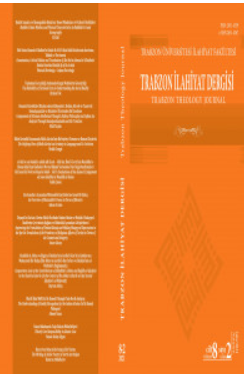Dilde Kesinlik Konusunda Molla Gürânî’nin Birleştirici Yorumu ve Bunun Eleştirisi
The Unifying View of Mulla Gürānī on Certainty in Language and Its Criticism
Author(s): Mehdi CengizSubject(s): Historical Linguistics, Philosophy of Middle Ages, Philosophy of Language, Rhetoric
Published by: Karadeniz Teknik Üniversites - İlahiyat Fakültesi
Keywords: Arabic Language and Rhetoric; Usūl-İ Fiqh; Fakhr al-Din Al-Rāzī; Al-Mukābara; Literal Evidence (Dalīl); Objectivity İn Language;
Summary/Abstract: In the tradition of Islamic thought, wording, meaning and the relationship between these two have been studied by disciplines such as kalām, philosophy and fiqh (jurisprudence). In this context, the theory of the supposition of linguistic signification, which is the main argument of those who prioritize the reason (aql), when reason and to the scripture (naql) conflict, has also been included in the agenda of the scientific world. According to this idea, which was theorized by Fakhr al-Din al-Rāzī (d. 606/1210), one of the important thinkers of the 12th century, language messages are exposed to different language possibilities such as metaphor. Therefore, it does not express certainty, but a supposition. In the 15th century, Mulla Gürānī (d. 893/1488) in his work named ad-Durer al-levāmiʿ examined this theory and stated that the language messages together with the ḳarīna expressed certainty. According to him, those who say that language messages express certainty have taken ḳarīna into consideration. Those who claim that it does not express certainty have asserted this independently of ḳarīne. In fact, Mulla Gürānī, who took this thesis one step further, stated that it is al-mukābara to say that a word does not express certainty together with the ḳarīna. This study aims to determine Mulla Gürānī’s view on the certainty of linguistic signification and to evaluate it. In addition, this study will show that Mulla Gürānī’s unifying approach is not correct. For this, firstly, information about the theory of the certainty of linguistic signification will be given and the parties to the conflict that Mulla Gürānī tried to unite around the idea of possibility will be determined. Subsequently, it will be determined what Mulla Gürānī’s opinion on the subject is and it will be shown that the debate is not a literal conflict as he claims, but a fundamental problem in the interpretation of religious texts.
Journal: Trabzon İlahiyat Dergisi
- Issue Year: 8/2021
- Issue No: 2
- Page Range: 140-153
- Page Count: 14
- Language: Turkish

